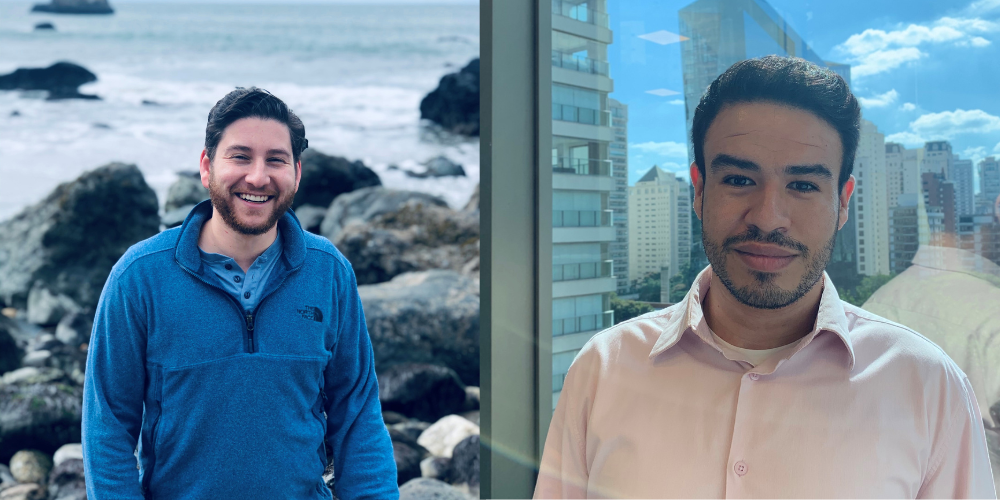Breaking the barriers

Lucas Brito and Dylan Safyer are co-chairs of The Bank’s LGBT+ & Allies Network, part of the Bank’s Employee Resource Group (ERG) that ensures the Bank is inclusive, embraces diversity, and fosters and promotes awareness of LGBT+ issues impacting the community in the Americas. This Pride month, Lucas and Dylan tell us how they came to be co-chairs, why it’s important for allies to call out exclusive behaviors, and how the Network is helping break down barriers.
Tell us your role and how long you’ve been at the Bank
Lucas: My current role is financial market investor sales. I’ve been with the Bank for 8 and a half years. I joined in the Brazil office as an intern and moved to New York in September 2019.
Dylan: I joined the Bank in 2015 as part of the International Graduate Program, an initiative where you’ll be offered an immersive, collaborative and global learning experience designed to provide technical, experiential, and on-the-job training over an 18-month period. Out of that, I worked in Transaction Banking in New York and then moved to San Francisco to join our client coverage team.
How did you both get started with the LGBT+ Network?
Dylan: I joined the LGBT+ and Allies in 2018. I have friends who are part of the community both inside and outside the Bank. I wanted to provide support and get a baseline education around related issues.
Lucas: When I joined the ERG in Brazil in 2016, what I wanted to do was to see if it was an accepting place before I felt comfortable coming out in the workplace. Shortly after joining the ERG, I realized that the Bank was LGBT+ friendly. Now I want to be part of the Network because there might be other people like me who need to know they are accepted and that it’s fine to be yourself at work.
Lucas, was it different in Brazil?
Lucas: It’s definitely harder. But I felt a change in the workplace just before I came out. I would occasionally hear jokes or comments that can be considered homophobic. But then I’d talk to people and say: “hey, I don’t feel comfortable hearing these kinds of comments,” and things stopped. That made me really happy. New York is the mecca for LGBT+ rights, so it’s a lot easier to be gay here.
That’s incredible that you felt empowered to call out that exclusive behavior…
Lucas: Yes. Also, my boss at the time was really understanding, and I heard him calling out people about their behaviors. I think it’s more important to have allies calling out that behavior, rather than me doing it, as it stops me from feeling like I’m coming across as overdefensive.
Have your experiences shaped what the ERG is trying to achieve?
Lucas: We are trying to increase engagement around the topic, and we have an educational role in making people aware of the challenges that the LGBT+ community faces.
Dylan, is that the same for you?
Dylan: For me, it’s about exposing bias and blind spots. Especially at certain levels, people think that we’ve figured this all out, so it’s impactful when people realize that they didn’t know something about the community or didn’t notice something was still affecting them. Getting people engaged, and then moving them from allies to advocates, is the biggest challenge.
What kind of things have you done to achieve that?
Dylan: We are trying to host more meaningful direct conversations. For example, on the International Transgender Day of Visibility, we invited a member of the trans community to come and speak. I don’t think many people within our organization have had the experience of interacting with someone who is transgender. Having just a normal conversation helped address some of the stigmas and break down barriers.
Lucas, is there an aspect of the ERG’s work that you’re most proud of?
Lucas: That webinar was a good example, and we were able to get senior-level people to support us and participate in the event. I remember vividly when a senior management team member asked: “how can we change things here?” I don’t recall that type of involvement from someone so senior before, which made me feel like we were making real progress.
What are the key things that the ERG will be working on in the coming year?
Lucas: Many people have joined the Bank during the pandemic and may not have even seen the faces of their own teams in person. So welcoming people back to the office and enabling them to bring their whole selves to work is one of our main objectives.
What’s the one thing people could do to make others feel more included?
Lucas: Treat others as you would like to be treated and be more empathetic. I think that about all the D&I agenda, not only the LGBT+ network. With that single behavioral shift, we could make so much more progress.
Dylan: Speak to someone you don’t know or have a candid conversation with someone different from you. It doesn’t have to be about anything relating to those differences but opens that door to communication.